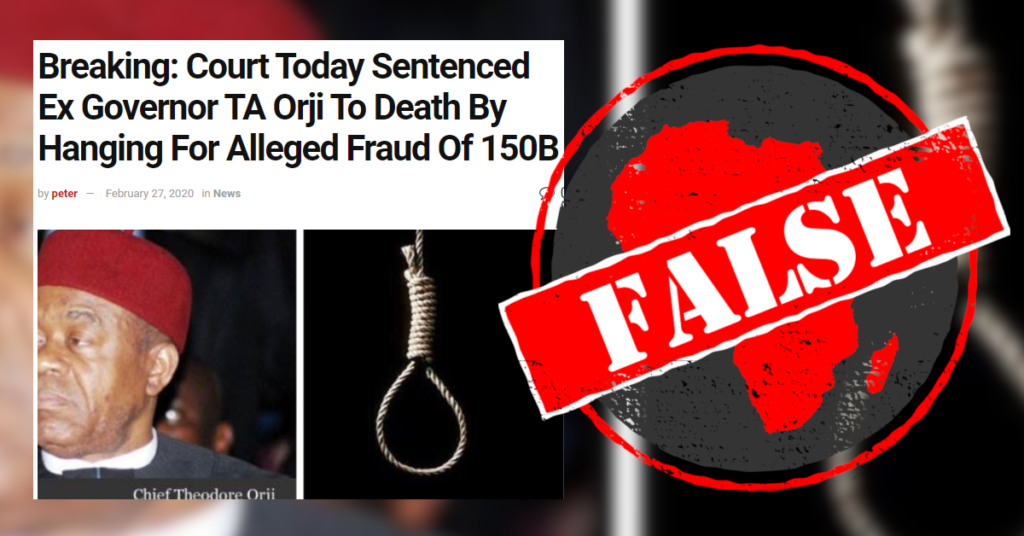A report published on 27 February 2020 claims that Theodore Orji, former governor of Abia state in southeastern Nigeria, has been sentenced to death by hanging for fraud.
Orji currently represents Abia Central district in the Nigerian senate.
“Breaking: Court Today Sentenced Ex Governor TA Orji To Death By Hanging For Alleged Fraud Of 150B,” the headline of the report reads.
“After every investigation of alleged fraud by the former governor of Abia State, the federal capital territory high court today sentenced ex Governor TA Orji to death by hanging,” it reads.
The report, which has been shared over 12,000 times on Facebook, ends abruptly with: “Details soon.” But, nearly two weeks after publication, the report has not been updated. We investigated if it was true.

Orji and his son Chinedum Orji are being investigated by the Nigerian Economic and Financial Crimes Commission on allegations of N521 billion fraud. The allegations follow the 12-year jail sentence for fraud of Orji’s predecessor, senator Orji Uzor Kalu, in December 2019.
The father and son were both quizzed by the anti-graft agency in early February. But as of 10 March there is no evidence they have been charged to court.
Orji Senior still serves as senator in the country’s national assembly, while Chinedum Orji still presides over Abia state’s house of assembly, as speaker.
The Economic and Financial Crimes Commission (Establishment) Act of 2002, by which the ex-governor could be tried, does not prescribe the death penalty. Theodore Orji has not been sentenced to death. – Allwell Okpi
Orji currently represents Abia Central district in the Nigerian senate.
“Breaking: Court Today Sentenced Ex Governor TA Orji To Death By Hanging For Alleged Fraud Of 150B,” the headline of the report reads.
“After every investigation of alleged fraud by the former governor of Abia State, the federal capital territory high court today sentenced ex Governor TA Orji to death by hanging,” it reads.
The report, which has been shared over 12,000 times on Facebook, ends abruptly with: “Details soon.” But, nearly two weeks after publication, the report has not been updated. We investigated if it was true.

Investigation still ongoing
Orji and his son Chinedum Orji are being investigated by the Nigerian Economic and Financial Crimes Commission on allegations of N521 billion fraud. The allegations follow the 12-year jail sentence for fraud of Orji’s predecessor, senator Orji Uzor Kalu, in December 2019.
The father and son were both quizzed by the anti-graft agency in early February. But as of 10 March there is no evidence they have been charged to court.
Orji Senior still serves as senator in the country’s national assembly, while Chinedum Orji still presides over Abia state’s house of assembly, as speaker.
The Economic and Financial Crimes Commission (Establishment) Act of 2002, by which the ex-governor could be tried, does not prescribe the death penalty. Theodore Orji has not been sentenced to death. – Allwell Okpi
Republish our content for free
For publishers: what to do if your post is rated false
A fact-checker has rated your Facebook or Instagram post as “false”, “altered”, “partly false” or “missing context”. This could have serious consequences. What do you do?
Click on our guide for the steps you should follow.
Publishers guideAfrica Check teams up with Facebook
Africa Check is a partner in Meta's third-party fact-checking programme to help stop the spread of false information on social media.
The content we rate as “false” will be downgraded on Facebook and Instagram. This means fewer people will see it.
You can also help identify false information on Facebook. This guide explains how.





Add new comment